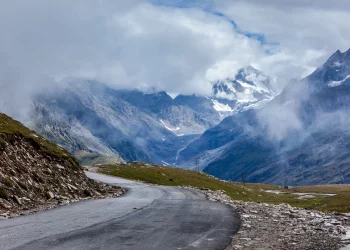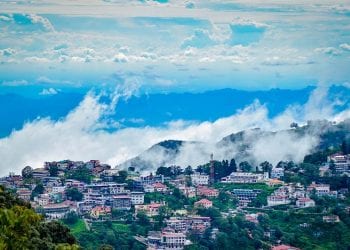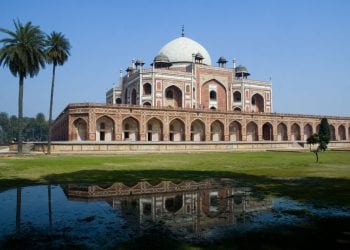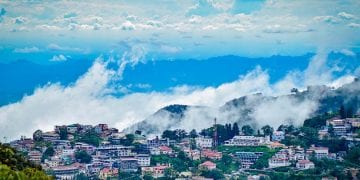Bodhgaya Temple: Trace the Footsteps of the Buddha
Bodhgaya in Bihar is the heart and birthplace of Buddhism as we know it today. The main Bodhgaya Temple or Mahabodhi Temple was declared a UNESCO World Heritage Site in 2002. Magnificent as it is now, the temple complex was once a shadow of its former self before it was restored by enthusiasts from all over the world. The temple was built by Emperor Ashoka in the 3rd century, with its current structure dating back to the 5th or 6th centuries. The temple was looked after by a community of monks from Sri Lanka till the 11th century before being destroyed by Muslim rulers. What the invading armies left behind was soon claimed by the ravages of time. The impressive temple complex standing today is a result of centuries of collaboration by dedicated groups of people the world over.
The temple’s spiritual energies have called out to pilgrims for hundreds of years. Those yearning for higher meaning continue to heed the call today. The peace of the Bodhgaya Temple doesn’t discriminate and welcomes all – whether you’re a pilgrim, architecture enthusiast, or a curious backpacker. Here’s how to make the most of your stay in the home of the Buddha.Walk in the footsteps of the Buddha at the Bodhgaya temple. Use your stroll past spirited vendors selling souvenirs and devotional items to prepare yourself for the wonder you’ll experience upon reaching the entrance to the temple complex. The din and preoccupations of the outside world become immaterial upon entering the hallowed gates of the most sacred Buddhist site in the world. The decorative spires of the temple tower 50 ft above you with complex and masterfully-etched carvings adorning them.
The main Mahabodhi Temple Complex is home to the legendary Bodhi Tree, as well as the temple itself. Besides the main shrine, walk around to discover several places of spiritual significance around the temple. Retrace the footsteps of the Buddha with the help of signs around the complex telling you exactly where you stand – and where the Buddha once stood – on the road to enlightenment.
1. The Inner Sanctum
The inner sanctum houses the main shrine, which is also called the Diamond Throne, behind which stood the original Bodhi Tree. A large, gilded black-stone Buddha sits inside the sanctum. The idol was built by the Pala Kings of Bengal in the 10th Century. The Buddha here is seen seated on a patterned cushion instead of the Lotus. His right-hand touches the earth – the posture which allowed him to reach absolute enlightenment. Next to the idol are beautifully-carved lotus flowers representing the footsteps of the Buddha.
2. The Bodhi Tree

The magnificent Bodhi Tree stands tall with stories that are 25 centuries old. The Bodhi Tree lies directly behind the main shrine to the west. The main shrine faces east, which is the direction Lord Buddha was facing while meditating under the tree. Situated inside the main Bodhgaya Temple, the ‘Awakening Tree’ formed the canopy under which Prince Siddharta sat to attain true enlightenment. The first sparks of the Buddhist faith began under this tree’s branches; soon, it would travel like lightning throughout the country and across the world. The present Bodhi Tree is the fifth descendant of the original and was planted in the 19th century during restoration work carried out by the British. The original tree died or was probably destroyed, with several trees meeting the same fate later on.
3. Meditation Around the Temple Complex
The Bodhgaya Temple complex is a haven for reflection and meditation. A great deal of spiritual activity takes place throughout the temple grounds. Monks clad in red robes along with people from different faiths sit serenely in meditation across beautiful lawns and under trees. It is quiet except for birds chirping in the trees and the gentle hum of Buddhist chants in the background. The waft of incense fills the air, along with the aroma of the tea and bread that Tibetan families bring daily to offer the monks. Walk to The Jewel House or Ratanaghara in the northeast of the complex to completely immerse yourself in the spiritually rich vibes of the place. People believe that Buddha spent the fourth week after enlightenment in meditation here. It’s easy to be swept away by devotion as monks perform prostrations, while others meditate deeply on wooden boards under a large Banyan tree.
The temple courtyard is filled with commemorative stupas and structures built over the years. Some of its standing ancient stone railings date as far back as 100 BC. The rest are now kept for display in the Archaeological Museum near the main road. To the south is a pond adjoining the temple complex and is believed to be the place where Buddha may have bathed. Another beautiful water body in the complex is called Mucalinda Lake and is located next to the main temple. The lake contains a beautiful statue of Snake King Mucalinda protecting the Buddha from a storm while he was meditating. Walk down further as a wide tree-lined path takes you to a stunning 80 ft stone statue of the Buddha. The statue was commissioned and made by Japanese Buddhists.
4. International Temple-Hopping

The Bodhgaya Temple complex also houses monasteries and temples belonging to several Buddhist countries. These stunning temples are open to the public and offer glimpses into how each country made Buddhism their own. All the temples reflect artwork and architecture belonging to their home country. The Royal Bhutanese Temple and Monastery contain colorful and intricate frescoes while the enormous Thai Temple is resplendent with beautiful frescoes and gold-rimmed rooftops. In contrast, the Japanese temple is simple and elegant in its beauty. This beautiful Zen temple has lovely lawns and a free school for local kids.
5. The Archaeological Museum
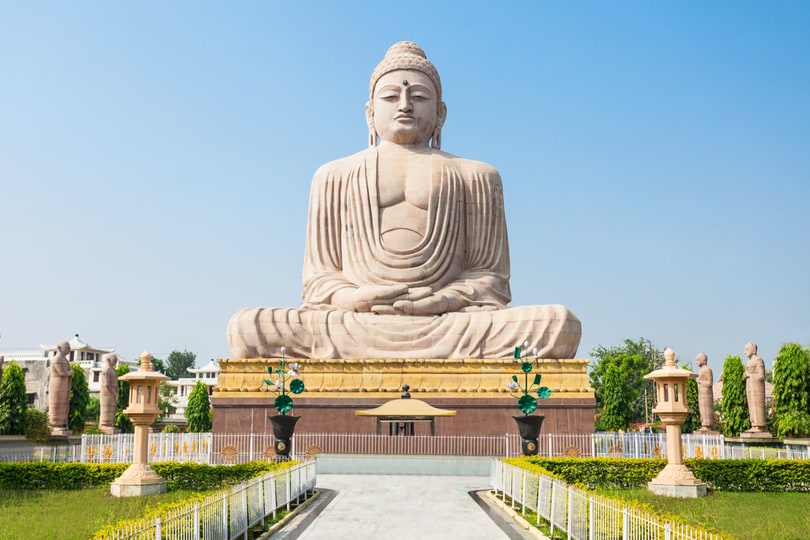
The wonderful Archaeological Museum is located on the main road of the Bodhgaya temple complex. The museum’s courtyard contains some of the granite and sandstone railings of the original Mahabodhi Temple. These structures are at least 700 years older than the current temple structure. The museum also houses rare antique terracotta items and Hindu idols made of bronze, silver, and gold. A 25m statue of a seated Buddha stands in the middle of a beautiful garden. The statue was unveiled by HH The Dalai Lama in 1989. The museum is open from 10 am to 5 pm daily except on Fridays.
Guidelines While in Bodhgaya

In the spirit of Buddhism, respect and tolerance are the foundations of this peaceful town. It is important to collectively help maintain the serenity that is the essence of Bodhgaya. Since this is a place of worship, visitors are asked to dress modestly and leave their phones behind in locker rooms at the entrance to the temple. Cameras are allowed inside the temple complex for a fee. Footwear is not allowed inside any of the temples.
The Mahabodhi Temple complex opens its doors from 5 am to 9 pm. The entry to the temple is free. The charge for cameras is 100 rupees and 300 rupees for video cameras. The meditation park remains open from sunrise until sunset and can be used for a small entry fee. For those interested, there are daily thirty-minute chanting sessions that take place at the temple at 5.30 am and 6 pm.
Restaurants in Bodhgaya
Bodhgaya is filled with restaurants and cafes catering to all palates! With pilgrims from across South and South-East Asia, the Asian fare in Bodhgaya is authentic and delicious! People who prefer good old Indian food are also spoilt for choice when in Bodhgaya. Tibetan food is a must-try especially if you’re visiting in the winter. The small food stalls lining the roads are a culinary delight – where Thukpa, momo, and noodles share space with delectable Thai, Korean, and Burmese curries.
For great café fare, try the pasta, pizza, and desserts at the immensely popular Be Happy Café. Siam Thai is known to have the best Thai curries. Mohammed’s Restaurant is popular for a good place of beef stir fry. Some of the other popular restaurants in Bodhgaya are Nirvana Veg Cafe, Tibet Om Cafe, Maya Heritage Restaurant, Oaks Cafe, Maya Rooftop Restaurant, Royal Residency, Hari Om Cafe, and Shyam Cafe.
Places of Interest Around Bodhgaya
Mahakala Caves
The Mahakala Caves also known as Dungeshwari Caves are located 12 km northeast of Bodhgaya. It was here that Buddha realized the futility of severe asceticism and instead embarked on a ‘middle path’ to achieving enlightenment. After this realization, he made his way to meditate in Bodhgaya where he achieved Nirvana.
Nalanda University
The ancient Nalanda University is located at a distance of 70km from Bodhgaya. The university was a premier seat of learning over 1500 years ago. This beautifully-preserved structure is now a UNESCO World Heritage site.
Rajgir
Rajgir is one of the most popular tourist destinations in Bihar. It is a town believed to be over 3000 years old and finds mention in the Mahabharata as well. The town was home to both Lord Mahavira and Lord Buddha – thus containing several Buddhist and Jain archaeological sites.
Wrapping Up
In a world that prioritizes instant gratification and busyness, choose to consciously slow down instead by leaving your worries behind at the Bodhgaya Temple. So, what are you waiting for? The center of the Buddhist world awaits!
How to Reach Bodhgaya
By Air: Bodhgaya International Airport and Patna airport
By Train: Bodhgaya Junction and Patna Railway Station. Both these stations are well-connected to major cities across the country
By Road: Bodhgaya is well-connected by road to major cities across the country
P.s. You might like these related resources
- Mahatma Gandhi Setu – Everything You Need To Know
- Take a Visit On Tourist Attraction Places of Patna!
- Planning A Trip to Gaya For A Spiritual Experience!
Recent Posts
Top Picks
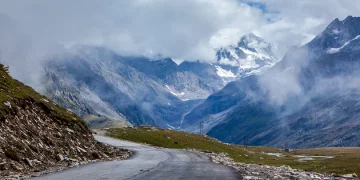
- OYO
 15 April, 2024
15 April, 2024 - Cultural Tour

- OYO
 15 April, 2024
15 April, 2024 - Cultural Tour

- OYO
 15 April, 2024
15 April, 2024 - Cultural Tour

- OYO
 15 April, 2024
15 April, 2024 - Cultural Tour

- OYO
 15 April, 2024
15 April, 2024 - Cultural Tour

Please rotate your device
Please go back to portrait mode for the best experience



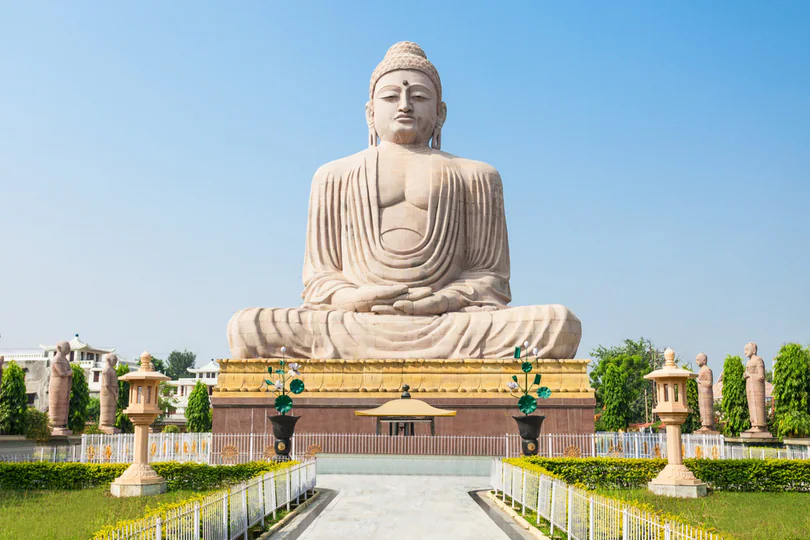

 April 15, 2024
April 15, 2024 